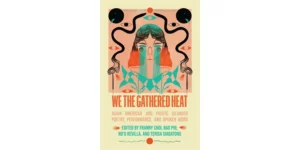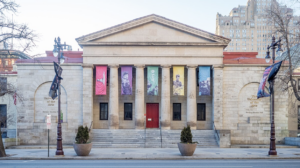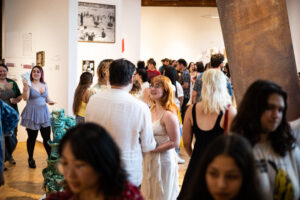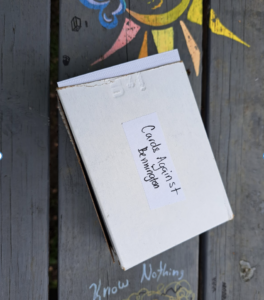
The literature evening event on Wednesday, October 2nd was a Grad School Panel, with Bennington faculty and recent alumni discussing graduate programs in literature and creative writing. Literature faculty Michael Dumanis, Mariam Rahmani, Franny Choi, and Devon Walker-Figueroa ’15 were joined via Zoom by recent alumni Car Simione ’23 (currently completing an MFA at the Iowa Writers Workshop) and Gerry Azpiri Iglesias ’23 (currently attending the MFA program at Cornell University). Panelists discussed their experiences, and a Q&A was held afterwards. This event was held in the CAPA Symposium and was open to the members of the Bennington community.
“Are you considering continuing your studies in Literature after Bennington? Whether you’re applying this year or thinking far ahead in the future, please join us for an info panel about MFA and PhD programs in Creative Writing, English, and Comparative Literature,” said the invitation email.
The event started off with Car Simione and Gerry Azpiri Iglesias talking about the applications process via Zoom, their experience at their respective programs so far, and their advice to Bennington students who wish to apply for graduate programs. Both Iglesias and Simione had a typical grad school journey and applied to MFA programs during their senior year at Bennington.
“Work hard and don’t stress,” said Iglesias. “Take advantage of the opportunities that Bennington offers,” he added.
“It was a pretty big deal to have a Bennington degree in creative writing,” said Simione, who is in their second year studying poetry at the Iowa Writers Workshop.
Speaking of creative writing opportunities at Bennington, the literature department boasts a wonderful track record. Michael Dumanis, who is the director of poetry at Bennington advises a number of Bennington seniors who apply for MFA programs each year. Along with current students, he also advises Bennington alums interested in getting an MFA. He also writes letters of recommendation for a few chosen students. “The literature undergraduate program at Bennington College does the work of a MFA in a way. Rigour is often encountered in literature and creative writing classes—[our program] can be even more intensive than other programs,” he said when asked about literature at Bennington. When asked about why get an MFA in creative writing, he said the following: “An MFA provides an opportunity to focus on your work as though your creative work is the most important thing in your life for 2-3 years in a community of other emerging writers with whom you’re exchanging work and engaging in conversations about art, literature and language. This is where you have multiple opportunities, too.”
It is notably very hard to navigate through the graduate school applications by oneself, which is why Bennington literature faculty stays accessible and tries to help as much as they can. This is why, while approaching graduate school applications, Bennington students work closely with the Bennington faculty, and discuss their portfolios, and their odds of getting into different places. “The literature faculty know the programs really well, and what the values and aesthetics of these programs are,” said Figueroa during the grad school panel. Most students apply to 8-13 programs. Each year, some students get into multiple places, some into all, and a few (2-3 notably) into none at all. At the same time, some students get into programs but choose to not attend. According to Dumanis, here are the three most important things to note while applying, that students submit alongside their graduate school application: student’s writing sample (and the promise someone sees in it), personal statement, recommendation letters from faculty in the genre students apply in.
During the panel, Dr. Mariam Rahmani—who has an undergraduate degree from Princeton and graduate degrees from Oxford, Columbia (MFA), and UCLA (PhD)—said the following about life after college: “Take 2-3 years outside of the academy and do something. Anything. Just to understand that there are jobs outside of academia. PhD is fun and great, you get to read a lot, learn a lot, and you’re able to piece the whole narrative together of what you’re studying. Also understand that it’s a really difficult job market, though.”
Franny Choi, who attended Brown University for undergrad, and the University of Michigan for MFA, offered the following advice: “Don’t go to an MFA program to figure out if you can be a writer. Go if you know that you are a writer. Workshops are an intense experience. They could be hard on many people. I knew I had a community and writers who were my friends.”
“Bennington reminded me that the writing life was an opportunity. I wanted to develop as a writer and my capacities,” said Figueroa, who graduated from Bennington College in 2015 and later attended the Iowa Writers Workshop and New York University for an MFA degree.
In the past decade, the passionate, and creatively-driven Bennington College graduates have matriculated to some of the nation’s top schools for MFA (degree in fiction, poetry, and nonfiction), MA and PhD in creative writing and literature. Schools with the most Bennington College matriculations (across all genres) are: University of Iowa (14) , New York University (8), and Columbia University (5). However, the enrollment stats at other schools still stand strong:
MFA:
Arizona State University (poetry)
Bennington College (fiction)
Brooklyn College (poetry)
Brown University (poetry)
Colorado State University (poetry)
Columbia University (fiction, poetry)
Cornell University (poetry)
Emerson College (poetry)
New York University (poetry, fiction)
Oregon State University (poetry)
Rutgers University-Newark (poetry)
University of Alabama (poetry)
University of British Columbia (fiction)
University of Idaho (poetry)
University of Iowa (poetry, fiction, translation)
University of Maryland (fiction)
University of Massachusetts-Amherst (poetry)
University of North Carolina-Wilmington (nonfiction)
University of Pittsburgh (poetry)
University of Texas at Austin-Michener Center (poetry)
University of Virginia (poetry)
Warren Wilson College (poetry)
Washington University in St. Louis (nonfiction, poetry)
MA:
Dartmouth College (Comparative Literature)
Carnegie Mellon University (Literary and Cultural Studies)
PhD:
CUNY Grad Center
University of Cincinnati
University of Iowa
University of Southern California
University of Minnesota
Northwestern University
University of Utah
While an MFA [in creative writing] can be a crucial first step to focusing solely on writing, one doesn’t need an MFA in order to be a writer. “Getting into grad school is not the same thing as having a book. We have students also who have published a book and most of them have gone to an MFA and some of them haven’t. But MFA is not the only way to become a writer. Some students have excelled in an MFA program but haven’t written books. A significant number of students have published books since they’ve graduated. There are a lot of successful writers who have published books who have not attended an MFA,” said Dumanis.
The event concluded at 8pm after the Q&A in which a number of questions were asked regarding the application process, advice, and the differences between MA, MFA, and PhD. “I have a firm grip over structuring my college experience, now that I know what I want to do,” said one of the attendees.





Be First to Comment